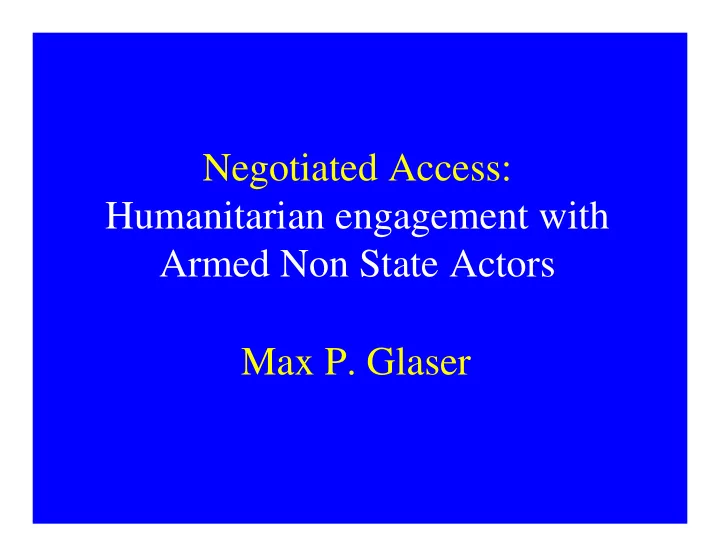

Negotiated Access: Humanitarian engagement with Armed Non State Actors Max P. Glaser
Two stages • Harvard University - KSG Carr Center for Human Rights Policy: Negotiated access - Humanitarian engagement with ANSA • HPN-ODI – Humanitarian engagement with ANSA – the parameters of negotiated access
The origins fo the project • Accumulated Qs • Initial Research Qs • Collapsed & failed • How do you decide states when to leave? • Safety & security • How do you get in? • Protection problems • How to talk to armed actors? • Human Rights & IHL • With who to talk?
More fundamental Qs • What does ‘negotiation’ actually mean? • What is negotiated in exchange for access? • Is it bartering (of positions / services) or • Persuasion (marketing of IHL principles)?
Two main issues • Who are the ANSA: What are their aims? How are they organized and how are they configured in conflict? • Who are the civilians: (Why) do they cooperate /collaborate with ANSA? (How) can they influence ANSA (behavior? How are they configured in conflict?
Trinitarian warfare
Non-Trinitarian Warfare
Configuration of civilians
ANSA classification Dependency on In-out group civilians dynamics Hi dependency and The broader the civil Protective protective to civilians constituency – the more receptive Vying over control of Strong sensitivity to in- Competitive territory / influence out groups dynamics over civilians Support one group Extrmely strong in- Antagonistic against another group group dynamics of civilians Diffused in-group Sectarian Independent dynamics.
Risk /benefit analysis Risks Benefits Accusations by states Access to aid Protective incumbent g’ments Influence behavior Neutrality/impartiality Accusations from Access to aid Competitive competing ANSA Protection Retaliation & threats Influence behavior? Abuse of aid (means) Access to aid Antagonistic neutrality / impartiality (limited) protection Undue legitimacy Access to dialogue? Accusations g’ments, Access to aid? Sectarian severe security risks Undue legitmacy
Interlocutor position
Challenge to negotiated access Structure Loose Clear (Lo- discipline) (Hi-discipline) Objectives Narrow Moderate Most challenging (Self-interested) Broad Least Moderate (e.g.Social/land challenging reforms)
Unwarranted / Unacceptable situations • ANSA in weak and defensive position, unable to guarantee access conditions • Highly competitive and abusive ANSA • Extremely antagonistic – genocidal ANSA • Sectarian – extreme and total spoilers
Global War on Terror • New concepts – “with us or against us“ (or “us against them”) • New actors – Transnational ‘total spoilers’ • New tactics – Individual (sleeper) cells • ‘New’ Methods – indiscriminate terror • Values & Ideologies – Political Islam vs. Christianity
New types (See: Jessica Stern – Terror in the Name of God) • The traditional organization: Terrorist armies & Commander-cadre organizations • The ulitmate organization: Networks, Franchises, Freelancers • ‘Virtual’ and Leaderless networks • Sleeper cells • Lone wolfers (avengers)
Consequences… • Fragmented audience – limited possibility to ‘persuasion’ or ‘bartering’ terms • Need for specialist knowledge: (Islam) – context, meaning and relation to society But: differentiate between Islam and radical political Islam! • Accept hi risks – casualties, kidnapping, assassinations
Thank you! Special thanks to ODI/HPN - Jacqui Tong and Matthew Foley for their dedicated and relentless support Max P. Glaser www.Pax-Consultancy.com mglaser@pax-consultancy.com
Recommend
More recommend